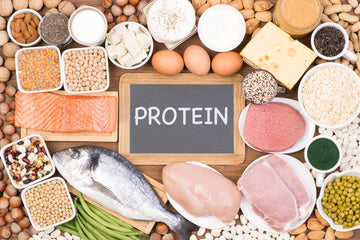Optimising Protein Intake for Health
Proteins are vital macronutrients made up of amino acids, which are the building blocks of our body's tissues, including muscles and organs. Out of the 20 amino acids, nine are considered essential because our bodies cannot synthesize them; they must be obtained through our diet. Protein plays a crucial role in growth, repair, immune function, and overall health. It helps maintain muscle mass, supports cognitive function by forming neurotransmitters like serotonin and dopamine, and aids in recovery from exercise or injury.
Protein needs vary based on several factors, including age, gender, activity level, and health status. The Australian recommended intake of protein is 0.84g/kg for males and 0.75g/kg for female however for weight management, we believe that is can be useful to have a higher intake, especially if you are exercising, of 1.2 to 2.0 grams of protein per kilogram of body weight daily. This range supports muscle mass during weight loss and helps prevent overeating by promoting feelings of fullness. High-protein foods such as lean meats, fish, eggs, dairy, legumes, and plant-based sources are ideal. Distributing protein intake evenly across meals can also optimize its benefits, helping to control hunger and maintain muscle mass, which are key factors in long-term weight management. This variability underscores the importance of tailoring protein intake to meet personal needs and goals.
Whole foods are the best sources of protein, providing a range of nutrients alongside essential amino acids. Complete proteins, which contain all nine essential amino acids, include fish, eggs, beef, milk, tofu, and tempeh. For those who may struggle to meet their protein needs through diet alone, protein supplements like powders can be a convenient option. However, it’s advisable to prioritize whole food sources to benefit from additional nutrients.
While adequate protein intake is essential, consuming too much can have adverse effects. Overconsumption, particularly from animal sources, can strain the kidneys and impair calcium balance, potentially reducing bone density. It’s crucial to balance protein intake with other nutrients and to consult with a healthcare provider if considering significant dietary changes.
To determine if you’re getting enough protein, consider your dietary sources and overall health. Signs of deficiency include weakness, immune dysfunction, and fluid retention. Timing of protein intake can also influence its benefits, especially for athletes. Consuming a protein-rich snack within 30 minutes after exercise can optimize muscle recovery and growth. Aiming for 20-30g of protein per meal is generally effective.
Current Australian guidelines provide a general framework for protein intake, but individual needs may vary. Recent research, such as a study published in December 2023, suggests that the optimal protein intake per meal may exceed previous estimates, particularly in terms of maximizing muscle protein synthesis. This highlights the need for ongoing research and personalized nutrition advice.
Protein is an indispensable component of a healthy diet, essential for various bodily functions. While it’s important to consume adequate amounts, balance is key to avoiding potential risks associated with overconsumption. Whether through whole foods or supplements, understanding your personal protein needs and timing can help you harness the full benefits of this vital nutrient. For more information on optimal protein intake and sources, consult a healthcare professional or a registered dietitian. Remember, a balanced diet that includes a variety of nutrients is the cornerstone of good health.
Watch Kate Save discuss how to optimise protein intake for health here
And for more health videos, check out our page below;









